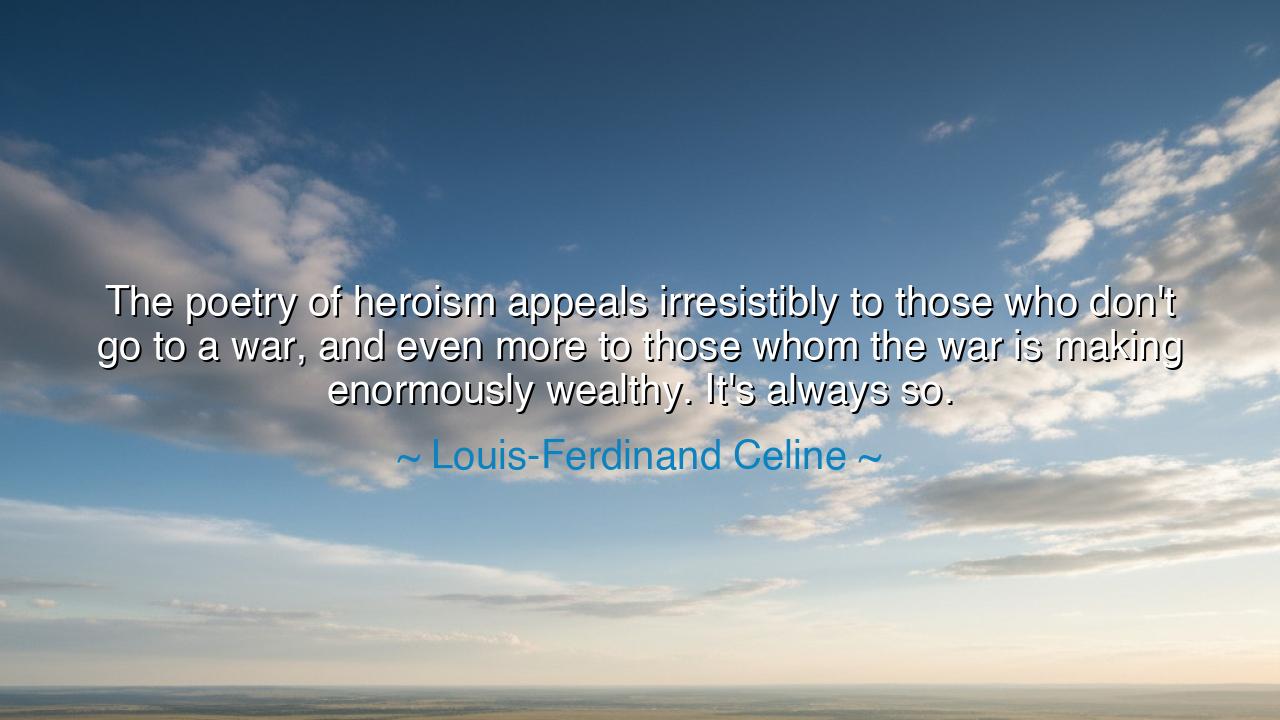
The poetry of heroism appeals irresistibly to those who don't go
The poetry of heroism appeals irresistibly to those who don't go to a war, and even more to those whom the war is making enormously wealthy. It's always so.






Hear now the sharp and bitter wisdom of Louis-Ferdinand Céline, who said: “The poetry of heroism appeals irresistibly to those who don’t go to a war, and even more to those whom the war is making enormously wealthy. It’s always so.” These words strike like a blade, cutting through illusions to reveal the hard truth: that the glory of war is most often sung not by those who bleed, but by those who watch from a safe distance—or profit from the suffering of others. The ancients too knew this, though they wrapped it in epic verse. Céline tears away the veil and shows us the old hypocrisy in its nakedness.
The poetry of heroism is the song, the story, the noble mask placed upon the horror of battle. It is the orator’s flourish, the statesman’s speech, the merchant’s justification. Those who sit far from the field are quick to praise sacrifice, for they do not smell the blood or hear the cries of the dying. And those who profit from war—the suppliers of arms, the hoarders of contracts, the hidden merchants of death—are swift to glorify it, for every anthem of heroism hides the sound of coins filling their coffers. It is always so, Céline warns: this pattern repeats across the ages.
History offers endless witness. Consider the Great War of 1914, in which Céline himself served and was wounded. In the trenches, soldiers drowned in mud and terror, their souls broken by machines of slaughter never seen before. Yet back in the capitals, men in fine suits spoke of heroism, parades marched, and poets who never touched the front wrote verses of honor and victory. Meanwhile, the arms factories roared, and fortunes swelled. The ones who suffered most had the least to say about glory; the ones who gained most shouted the loudest.
Even in the time of Rome, this truth was plain. Senators and orators spoke of the valor of legionaries, of the poetry of empire and conquest. Yet who filled their purses when provinces fell? Who drank wine from silver cups purchased by plunder? It was rarely the soldier who froze on the Rhine or bled on the sands of Parthia. It was the wealthy and the distant, praising heroism while others paid its price in flesh. Thus, Céline’s saying is no modern bitterness alone, but the ancient cycle dressed in new clothes.
And yet, the appeal of this poetry is powerful because humans long for meaning in sacrifice. To call war noble is to soothe the conscience of those who send others to fight. It is easier to praise heroism than to face the truth of destruction. The common man, yearning for pride, may accept such verses; the profiteer, eager for gain, will amplify them. Only those who have seen war’s face stripped bare know how false such poetry often is.
What then shall we learn? First: be wary of voices that glorify what they themselves will not endure. Trust not those who profit from conflict yet clothe it in noble language. Instead, seek the testimony of those who have walked through fire, who speak with scars and silence rather than easy verse. Their words are the true measure of war, not the polished lines of those who stand far from danger.
Practically, let us honor sacrifice not with empty poetry, but with care for the living and the wounded, with devotion to peace, with vigilance against those who would trade lives for gold. Question always the noble speech of those who stand to gain. Teach children not only the songs of valor, but the cries of the broken, so they will not be deceived. And above all, remember Céline’s bitter gift: it is always so—unless we choose to see, to remember, and to act differently. For only in truth, not in false poetry, can heroism be rightly honored.






HMHai Minh
I find Céline’s observation about the appeal of heroism to those untouched by war disturbing yet insightful. It highlights how war often becomes a distant spectacle for some, while others profit from it. Is this disconnect why so many fail to truly understand the human costs of war? How can we shift the conversation to address the real impacts of conflict and prevent it from being reduced to a heroic narrative?
NDNguyen Du
Céline’s quote speaks to the uncomfortable truth that war is not only a source of tragedy but also a path to wealth for some. What does it say about society when those who are far removed from the pain and destruction of war find it easy to glorify heroism? How do we, as individuals and communities, confront this disparity and prevent the romanticization of violence that benefits only a select few?
VHDo Vu Hoang
This quote by Céline raises a powerful point about the disconnect between those who romanticize war and those who profit from it. It makes me think about how often the glorification of heroism is detached from the suffering that actually occurs. Does this blind admiration for war heroes come from ignorance, or is it a deliberate attempt to downplay the true costs of conflict? How do we challenge this narrative?
NTNhat Thanh
Louis-Ferdinand Céline’s quote really critiques how war is romanticized by those who are far removed from its brutal realities. It’s troubling to think that people who benefit financially from war, without experiencing its horrors, might celebrate heroism in such a detached way. How does this shape our collective view of war, and can we ever truly understand the consequences when we’re not directly affected by it?